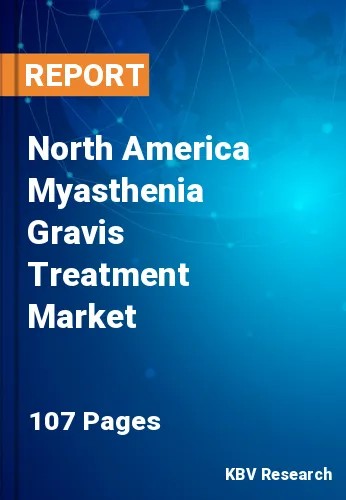The North America Myasthenia Gravis Treatment Market would witness market growth of 8.7% CAGR during the forecast period (2023-2030).
Technological advancements are enabling remote patient monitoring and the collection of real-time data, enhancing disease management and treatment adjustment for MG patients. Gene and cellular therapies are being investigated as potential treatments for MG, with the prospect of long-term remission. Gene therapy involves modifying or introducing genes into a patient's cells to correct a genetic abnormality or alter the disease process. In the context of MG, gene therapy is being explored as a potential way to target the immune system dysfunction underlying the condition.
Gene therapy tries to change the activity of specific immune system cells, like T cells or B cells, to limit the creation of autoantibodies that assault the neuromuscular junction. Autoantibodies attack the neuromuscular junction. This could lessen the immune response against the patient's tissues, addressing the root cause of MG. Introducing genes that regulate the immune response could help restore immune tolerance, reducing the attack on the neuromuscular junction and thus preventing muscle weakness and fatigue.
The United States has one of the highest healthcare spending levels per capita. Factors contributing to high healthcare spending include the cost of medical procedures, pharmaceuticals, and administrative expenses. While the United States relies on both public and private healthcare finance, Canada has a publicly supported healthcare system. Government involvement is a significant factor in healthcare spending and investment in both countries. As per the data given by the United States Centres for Medicare and Medicaid Services, healthcare spending in the United States rose 2.7% in 2021, amounting to $4.3 trillion, or $12,914 per person. Growing investment in healthcare services across countries in North America will boost the demand for treatments in the region.
The US market dominated the North America Myasthenia Gravis Treatment Market by Country in 2022 and would continue to be a dominant market till 2030; thereby, achieving a market value of $1,255.4 Million by 2030. The Canada market is experiencing a CAGR of 11.1% during (2023 - 2030). Additionally, The Mexico market would exhibit a CAGR of 10.2% during (2023 - 2030).
Based on End-use, the market is segmented into Hospitals, Clinics and Others. Based on Type, the market is segmented into Monoclonal Antibodies, Thymectomy, Cholinesterase Inhibitors, Chronic Immunomodulators, Rapid Immunotherapies and Others. Based on countries, the market is segmented into U.S., Mexico, Canada, and Rest of North America.
Free Valuable Insights: The Myasthenia Gravis Treatment Market is Predict to reach $3.8 Billion by 2030, at a CAGR of 9.2%
The market research report covers the analysis of key stake holders of the market. Key companies profiled in the report include AstraZeneca PLC (Alexion Pharmaceuticals, Inc.), Octapharma AG, Novartis AG, Pfizer, Inc., Allergan PLC (AbbVie, Inc.), F. Hoffmann-La Roche Ltd., GlaxoSmithKline PLC (GSK), Bausch Health Companies Inc., Kedrion S.p.A, and Zydus Lifesciences Ltd.
By End-use
By Type
By Country
Our team of dedicated experts can provide you with attractive expansion opportunities for your business.

